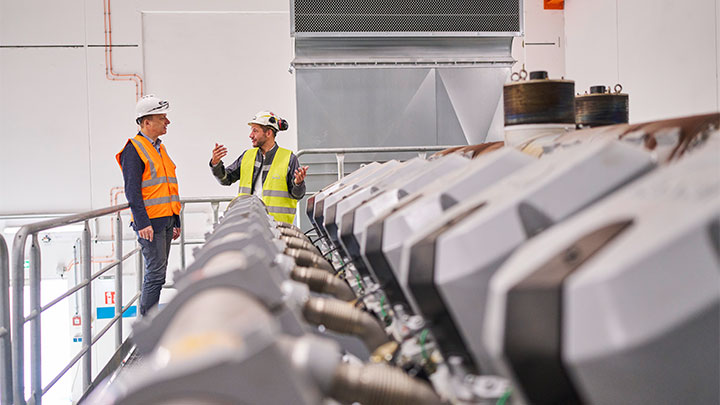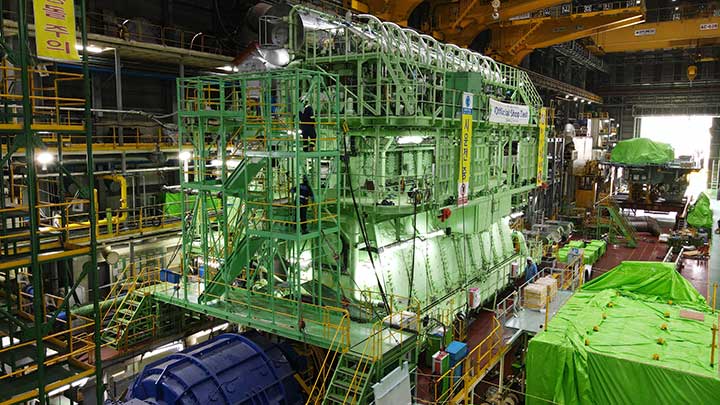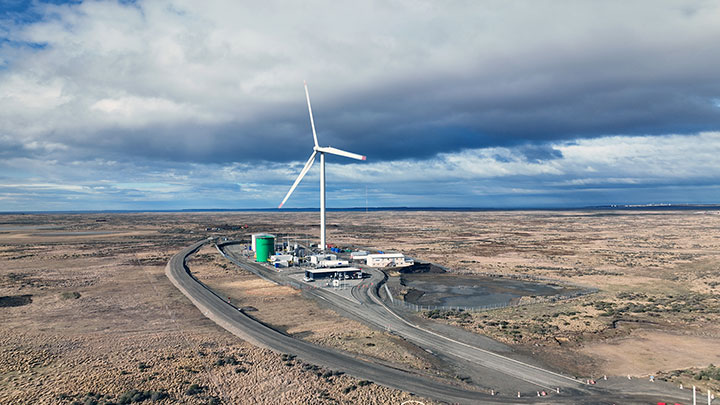Leveraging key technologies to achieve sustainability
We have always considered challenges within the larger context. Today, this means acknowledging that no one single solution or technology can get us towards our goal of net zero emissions. This is why we have selected and developed five key technologies which make up the center pillars of our decarbonization strategy, complementing our existing and always evolving core portfolio.
These technologies are able to reduce emissions in hard-to-abate sectors such as shipping, power and heat generation, industrial processes such as cement and chemicals, which are energy-intensive and hard to electrify. Green engines, solutions for carbon capture, utilization and storage (CCUS), as well as innovative industrial-scale heat pumps, cost-effective electrolyzers for green hydrogen production and retrofitting solutions – all of these technologies give us the leverage to decarbonize industries as quickly as possible.
Our five core technologies have immense leverage to reduce CO2 emissions. With these alone, we can address up to 10% of global CO2 emissions.
Key transitional technologies
The following figures are examples of the benefits of MAN Energy Solutions’ solutions
5 key future technologies
We offer a portfolio of pioneering future technologies that help fight climate change while presenting significant market potential and business success. With our know-how, expertise and leading edge in each of these technologies, we are well-equipped to provide sustainable solutions to the current climate challenges.
We retrofit ships and plants to reduce fuel consumption and emissions.
Our green engines powered by future fuels such as green hydrogen, ammonia, methanol, and biofuels, are essential for long-term decarbonization.
We are also working with partners on CCUS (carbon capture, utilization, and storage) to capture and store unavoidable carbon dioxide emissions.
Lastly, our heat pumps are an energy-efficient solution for heating and cooling buildings by reducing energy demands.
Related news
MAN Energy Solutions and Vicinity Energy to Cooperate on US Heat Pump Project
MAN Energy Solutions and Vicinity Energy have entered into a Memorandum of Understanding (MoU) in the field of heat pumps as a low climate impact energy source for district heating. Together, the companies will collaborate in the advocacy for and the development of low-temperature source heat pump systems for steam generation and their application in the district energy systems. The document was signed by the CEOs, Uwe Lauber for MAN Energy Solutions and Bill DiCroce, President and CEO at Vicinity Energy.
“The heating sector accounts for 30-40 percent of global CO2 emissions. Without decarbonizing heat the global energy transition cannot succeed,” says Uwe Lauber. “At the same time district heating systems are one of the most efficient and sustainable ways to provide heat to private households, commercial buildings and also industrial facilities. Hence the task is to reduce district heating systems’ dependence on coal or fossil fuel fired heat sources. Our heat pump technology can do that and we have showcases in the field in Europe to prove it. I am very happy that we could win the trust and support of Vicinity Energy to work together on the application of our technology to Vicinity’s impressive district energy system.”
“Vicinity’s first heat pump complex in Cambridge, MA, which draws from proven examples in Europe, will be the largest in the U.S. It will be powered by renewable electricity to safely and efficiently harvest energy from the Charles River, returning it at a lower temperature," says Bill DiCroce, president and CEO of Vicinity Energy. “We have made a lot of progress harvesting the energy of the sun and wind, MAN’s cutting-edge technology will now enable Vicinity to renewably harvest energy at scale from rivers and oceans, which are presently warming from the effects of climate change. This is a big deal in district energy’s efforts to decarbonize cities, and Vicinity is very proud to lead the way with MAN in this exciting venture.”
Vicinity Energy is a leading district energy company operating North America's most extensive energy portfolio. The company strives to decrease its carbon emissions by replacing conventional energy sources with renewable power and implementing innovative technologies to reduce energy consumption and greenhouse gas emissions.
Moving Big Things to Zero
True to its claim “Moving Big Things to Zero” MAN Energy Solutions provides equipment and holistic solutions to help and decarbonize energy generation, shipping and industrial sectors that are considered hard to abate. The company is convinced that large scale heat pumps are one of the most essential technologies to facilitate the climate neutral generation of heat and steam.
“Instead of burning fuel for heating and cooling purposes, heat pumps make efficient use of manifold heat sources, such as lakes, rivers, sea, wastewater, industrial waste heat, geothermal, or ambient air”, says Uwe Lauber. “Running on green electricity, they have virtually zero emissions. Our large-scale heat pumps are comprised of compressors, expanders, and companders. Using our electrothermal energy storage technology, customers can even add the option to generate, store, and reconvert heat or cold.”
Documents
-
202304_MAN ES Press Release Vicinity_ENG
Contact
Jan Hoppe
Head of Group Communication & Marketing
Group Communications & MarketingMAN Energy Solutions SEStadtbachstr. 186153 AugsburgGermany
Jan.Hoppe@man-es.com t +49 821 322 3126Available languages
- DE ·
- EN
Get notified about press releases
Related articles
-

Gas engine power plant in Chemnitz
Find out how two gas engine power plants in Chemnitz, Germany, are cutting CO2 emissions by 60 percent and paving the path for a carbon-free future.
-

Methanol fueled ships
Sustainable shipping starts now. Find out more about the first large-scale engines for container ships run on green methanol.
-

Haru Oni e-fuels
The Haru Oni demonstration plant could pave the way for a viable alternative to fossil fuels: It produces synthetic e-fuels from hydrogen that can help the fight against climate change. MAN Energy Solutions provided the e-methanol reactor to the plant.
